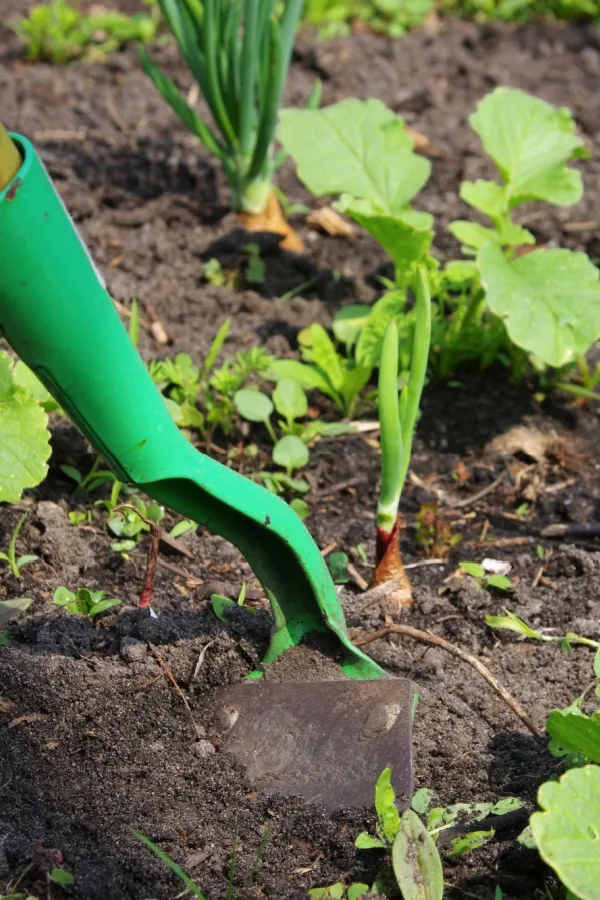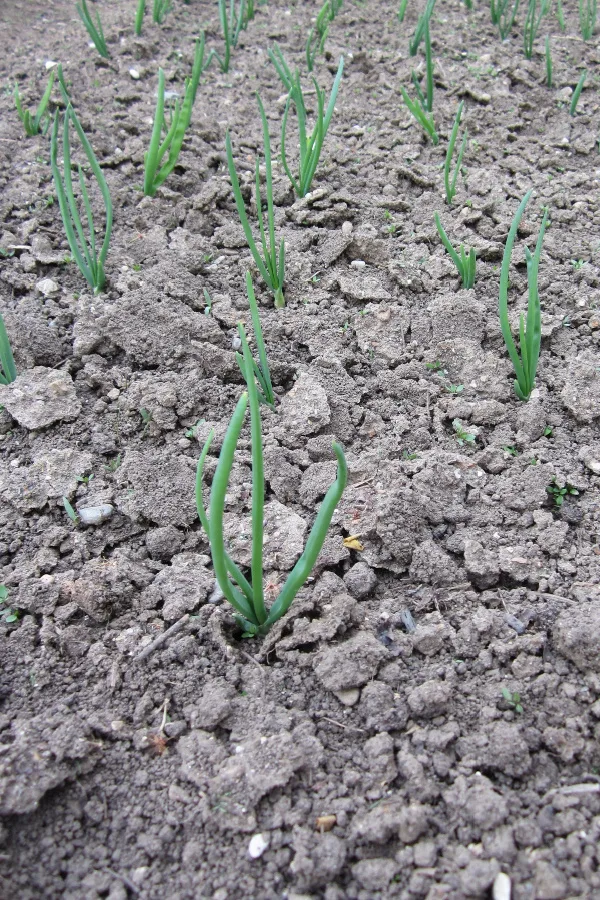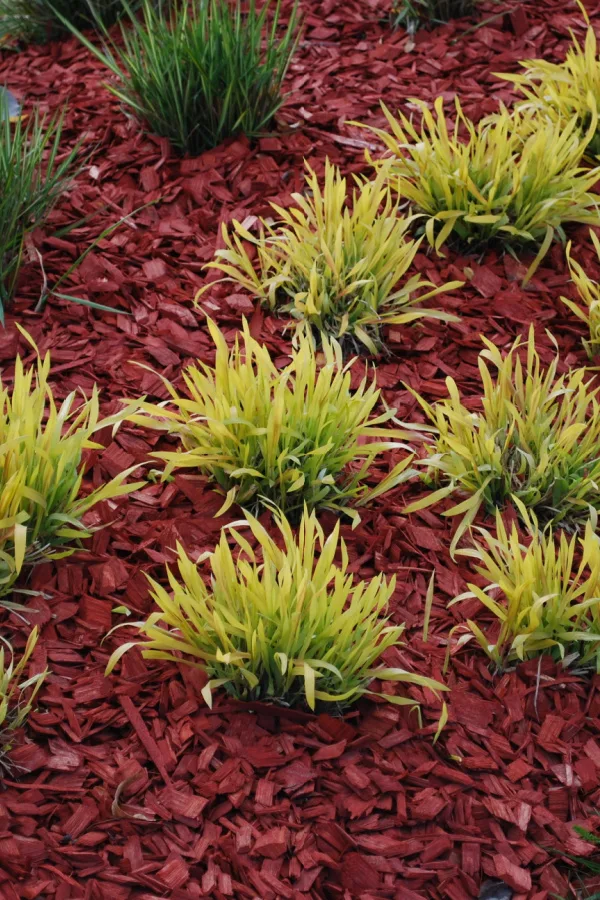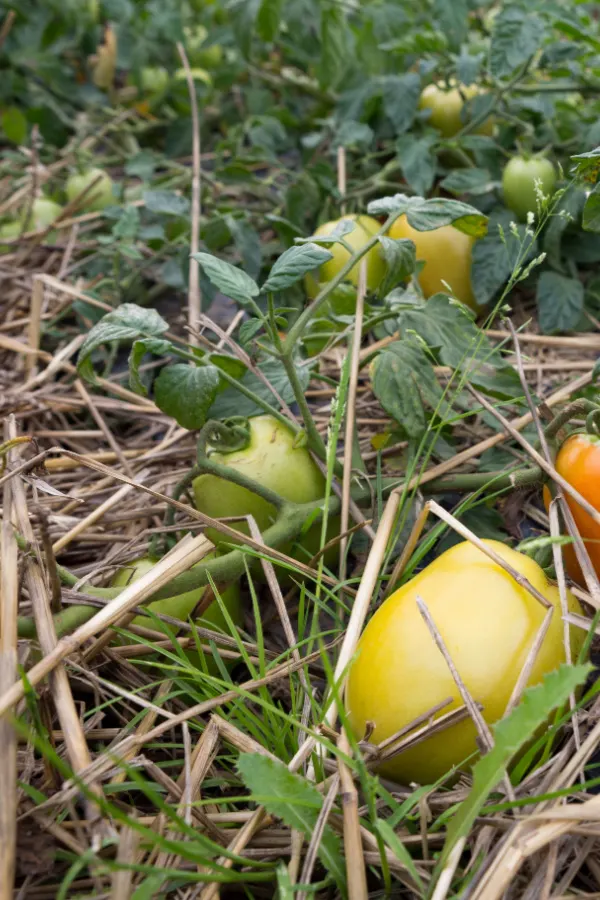One of the best ways to create both a low-maintenance and highly productive vegetable garden is by using mulch around your plants – especially when you can avoid a few of the more common mulching mistakes that can spell the difference between smashing success or a disappointing growing season!
When it comes to vegetable gardening, mulch unfortunately quite often takes a back seat to many of the other more glamorous aspects of growing. And yet, as you will see below, it can be one of the most critical parts of creating an amazingly productive and weed free garden.
The benefits of using mulch in your vegetable garden are enormous. For starters, mulch can keep weeds from becoming an issue. And weeds do more than just make your garden space unsightly – they also steal valuable nutrients from your plants.

But the value of mulch in a vegetable garden goes far beyond simply stopping weeds. It also helps to regulate soil temperatures, conserve moisture, and in many cases, also help to prevent disease and pest issues as well.
Unfortunately, mulch can also cause the opposite effect of all of the above benefits when not used correctly. With that in mind, here are the 3 biggest mistakes gardeners often make when it comes to using (or not using) mulch in their vegetable garden – and how to avoid them for an incredible growing season!
Mistakes To Avoid When Mulching Vegetable Plants
Mistake #1 – Not Mulching At All
So what is the biggest mulching mistake of all when it comes to vegetable gardens? That would be in a landslide victory not mulching at all!
When you leave bare soil around plants, you are essentially inviting all kinds of weed seeds to land and take root. Weed seeds can be brought in from the wind, carried by birds, or even hitch a ride in from you on your boots or clothing.
In bare soil, weeds run rampant. They quickly spread to cover the soil – all while stealing valuable nutrients away from your plants. Weeds can also carry disease and be a host home for pests. And of course, if they grow big enough, the weeds produce even more weed seeds that become the next wave of weeds!

Bare soil also dries out in quick fashion. Not only on the surface, but down deep where the roots of your vegetable plants need moisture the most. In addition, leaving the soil bare leaves it open to erosion, which takes away even more nutrients from your plants.
Last but not least, without any covering on the soil, the soil can easily overheat on a hot summer day or cool off too much on cold nights – all of which can stunt the growing of your plants in big fashion.
The good news? You can solve all of the above issues with a thick layer of protective mulch. And in the process, work far less in your garden this year. No more constant weeding. No need for tilling and re-tilling your soil. And you can also save time on those watering chores too!
Mistake #2) Using The Wrong Mulch
So what is the best mulch to use in your vegetable garden around plants? One thing is for sure – there are a lot of choices when it comes to mulch, but when it comes to using it in the vegetable garden, selecting the wrong one can spell big trouble for you and your plants.
When mulching around plants, avoid thick wood or synthetic mulches. Not only do many of these contain dyes that can be dangerous to your plants and the food you consume, they also can mat down and keep nutrients from passing through the soil below.
Instead, when mulching around plants, use natural organic mulches that can break down easily into the soil. Some of the best mulches in this category are straw, grass clippings and shredded leaves. See: How To Grow Your Own Mulch At Home And Save!

All of these materials can protect the soil from weeds, moisture loss and sudden temperature changes. They also happen to add organic material to the soil as they break down. But most importantly, they all allow nutrients and moisture to easily pass through to the soil.
There still is a place for shredded hardwood or wood chip mulches in your garden. These thicker materials are great for using in your garden’s walking paths. Just ensure they don’t contain dyes or other chemicals and are 100% natural.
Mistake #3) Not Mulching Deep Enough – Mulching Vegetable Plants
The third biggest mistake when it comes to mulching your vegetable garden plants is not using enough mulch. A thin layer of mulch simply will not provide the protection your plants and soil needs.
It’s kind of the same principle as using a blanket when cold. If you have only a thin blanket, it will help a bit for sure, but you likely will still be cold. But put on a big thick blanket – and you can stay warm and comfortable for a long time. The same goes for mulch around plants!

To be effective, mulch should be at least four inches in depth. Six inches is even better! While you don’t have bare soil with a light covering of mulch, weeds – especially stubborn varieties, are still going to push through a layer of just an inch or two.
In addition, thin mulch will not do much to help keep the soil temperatures regulated, and it certainly won’t be enough to help retain moisture levels either.
Don’t Forget To Add Mulch – Mulching Vegetable Plants
Also, keep in mind that you might have to add more mulch throughout the growing season. If you are using organic mulch like grass clippings or straw, they will break down as the growing season progresses. To keep the perfect level of protection for plants, simply add more as needed.
By avoiding these three simple mulching mistakes, you will be able to enjoy your vegetable garden plants more and spend less time watering and weeding this summer! In addition, you will be doing your soil a great service by helping to prevent bare soil while adding organic matter and nutrients back to it at the same time.
For more on stopping garden weeds, check out our article : 2 Simple Secrets To Stop Weeds For Good!
Follow Our Facebook Page For Even More Great Tips! Simple Garden Life Facebook Page
Simple Garden Life is a website dedicated to keeping gardening fun, simple and enjoyable! We publish two new articles each week along with a new garden podcast episode every two weeks. This article may contain affiliate links.
